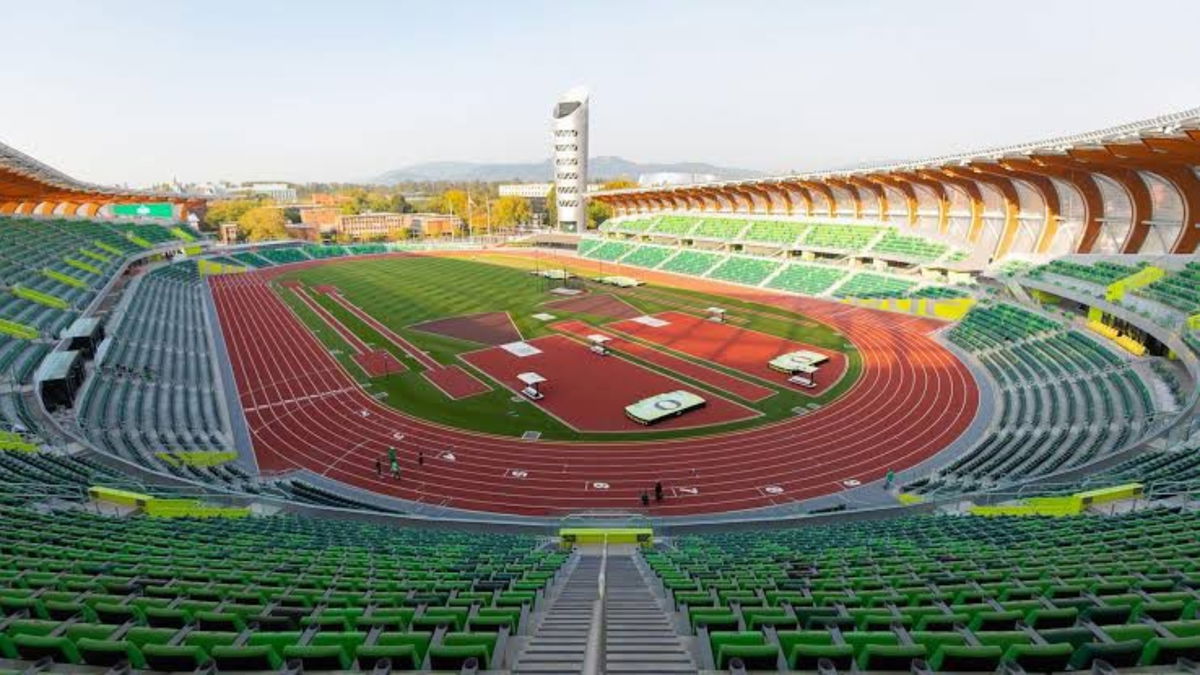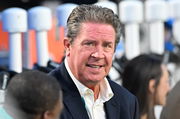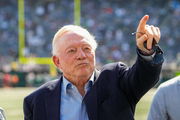

The 2024 Préfontaine Classic is set to take place at the renowned Hayward Field in Eugene, Oregon, a venue celebrated for its rich history and state-of-the-art facilities. Named after Bill Hayward, a trailblazing coach who led the University of Oregon’s track and field program from 1904 to 1947, the stadium was rebuilt in 2018 on its original site. However, as the Diamond League event approaches, Michael Johnson, a retired American sprinter, has stirred some online debate.
Watch What’s Trending Now!
Now working as a BBC commentator, Johnson posted a video on X showing the magnificent, albeit sparsely populated, Hayward Field, captioning it, “Hayward is hands down the best track & field stadium in the world.”However, he promptly clarified the scene, noting that the empty stands were a result of a media race held the previous night. He’s never been one to mince his words, be it with regard to omitting Gabby Douglas’ name from his future track contenders wishlist and and this time around, his brazen stances provoked the ire of the masses.
With a playful twist, Johnson posed a lighthearted challenge to his audience, daring them to identify a stadium that could outshine Hayward Field in terms of track and field infrastructure alone. He humorously implored, “Just tell me what is a better stadium?” setting aside factors like location or atmosphere for a moment of spirited reflection on the essence of stadium excellence in the realm of track and field.
ADVERTISEMENT
Hayward is hands down the best track & field stadium in the world! pic.twitter.com/SFfo8PDfr2
— Michael Johnson (@MJGold) May 25, 2024
This comment has not sat well with some fans, who have responded with criticism and suggested that Johnson should “Come Off Twitter.” The backlash did not stop there, as it appears that fans continue to strongly disagree with his assessment.
ADVERTISEMENT
Insights aligned with Michael Johnson’s philosophy about track and field stadium
Some fans have voiced concerns over the implications of such high praise for Hayward Field, especially regarding its accessibility. One fan expressed frustration over the financial burden placed on average fans, remarking, “Maybe but it’s unaffordable for the average fan. This sport seems to go out of its way to make the sport less popular. We need events in bigger cities that are affordable to travel to and get affordable accommodations.” This perspective underscores the concern that high costs, including ticket prices starting at $25 plus additional fees, might be driving away the very supporters who help popularize the sport.
Another viewpoint was shared by a fan who pointed out the possible consequences of the sport’s drive towards exclusivity, saying, “That may be true, but at the expense of our sport. Not a popular opinion, but just as factual. When true fans can’t make it to those special events, it becomes an elitist event and in our sport we don’t need that. Penn Relays and the DL events being sold out packed to the hilt.” The fan suggests that although high-profile events may attract a lot of attention and sell out, there’s a danger that they could become exclusive or too expensive for ordinary, dedicated fans to attend. This exclusivity could ultimately damage the sport’s ability to welcome and engage a diverse range of enthusiasts, undermining its reputation for inclusivity.
ADVERTISEMENT
The issue of venue suitability was also addressed by a fan critical of the choice of Eugene, Oregon. They commented, “lol no it isn’t. And Eugene weather sucks for speed/power. It’s only good for distance running. The best thing USATF could do is abandon Eugene for speed/power/throws and move to Texas, Florida, Phoenix, or Cali.” This reflects the need for strategic venue choices that enhance the performance across various disciplines, rather than favoring only one at the expense of others.
Top Stories
“Rest in Peace”: Prayers Pour In From Dan Marino as Dolphins Legend Mourns Tragedy in South Florida Football

Florida Police Arrest Millionaire NASCAR Veteran Over Disturbing Public Misbehavior

“NFL Was Crying”: Maxx Crosby Says League Forced Him to Remove Shoes Honoring His Daughter

Jerry Jones Reaches Breaking Point With Cowboys Coach as Matt Eberflus Receives Clear Order

Chiefs’ Patrick Mahomes Makes Final Decision on Return Date After Undergoing ACL Surgery: NFL Insider

Denny Hamlin Demands Immediate Apology From FOX Broadcaster After Michael Jordan’s Lawsuit Triumph

Nostalgia for earlier times when venues like the old Hayward were more accessible also came through in another fan’s lament. “The old Hayward, before they jacked up the prices so high, was better as the crowds all knew exactly what was happening, in real time, in field and on the track. It was sold out for the majority of meets.” This fan’s recollection serves as a reminder that higher prices can diminish the engagement and understanding of the spectator, which are crucial for a vibrant sporting atmosphere.
Finally, the straightforward expression of another fan summed up the sentiment of many: “But the most expensive 😭.” This concise critique encapsulates the broader frustration with rising costs that could alienate the base of dedicated followers, stressing the importance of keeping sports events economically accessible to sustain a lively and engaged fan community.
ADVERTISEMENT
ADVERTISEMENT
ADVERTISEMENT
ADVERTISEMENT

